Marketers Welcome: Start a Private Label Business With Already-Proven Products

You don’t have to invest in product development to start selling products online. In fact, there are many ecommerce business models that allow you to sell merchandise without ever even touching the products themselves.
Private labeling is one such business model. With private labeling, you work with a third-party manufacturer to create your own custom branded products. Private labeling is great for people and brands that already have established audiences and want to find a way to start generating passive income online via product sales.
Click and jump to a section
What is private labeling and how does it work?
Private label products, similar to white label products, are goods created by one company to be sold and branded by another company. A business owner selling private label products is looking for a product they can put their own brand name on and sell as if it’s their own. Clothing and cosmetics are common private label products, as are condiments sold in grocery stores.
Total retail sales in the US for private label products hit $5.47 trillion in 2019 and are projected to hit $5.94 trillion in 2024, according to data from Statista. That’s no surprise, considering you see private label products in most major retail stores. Target has its Archer Farms private label, for example, Walmart has Great Value, and Costco has Kirkland.

Advantages of private labelling
Private labeling has a number of advantages that span beyond simplifying the product development process. Some of those advantages include:
- Control over production. You direct third-party manufacturers in terms of materials and ingredients, quality, and production rate.
- Control over pricing. As the seller, you determine your pricing strategy and have control over how you optimize production costs, which helps with creating a healthy profit margin.
- Adaptability. Smaller retailers can move quickly to get a private label product in response to rising market demand for a new feature, while larger companies might not pursue a niche product.
- Control over marketing and branding. You choose how to promote and package private label products before making them available for sale.
Disadvantages of private labelling
While there are many benefits to private labeling, it doesn’t come without its challenges:
- Manufacturer dependency. Because a third-party manufacturer handles production, you’re largely at their mercy. That’s why it’s so important to find a reputable and reliable manufacturer to work with.
- Difficulty building loyalty. It can take time to get traction when starting a brand from scratch. This is one reason why private label products are great for people and brand names who already have an established audience that trusts them.
- Poor consumer perception. Private label products commonly have a reputation for being cheap or low quality. However, that perception is changing. Many consumers around the world believe the quality of private label products is improving.
Free Webinar:
How to quickly start a profitable print-on-demand store
In our free 40-minute video workshop, we'll get you from product idea, to setting up an online store, to getting your first print-on-demand sale.
Private label manufacturers for creating a custom branded product line
While many private label manufacturers may seem similar, it’s important to vet them carefully to find the one that suits your business now and in the future. You have to consider what types of products you want to make and sell, where you want to sell and ship them, and how high you can price them.
Below is a quick overview of some of the best private label manufacturing services and product sourcing apps for all kinds of goods. Most here have a Shopify app you can use to connect directly to your online store.
SupplyMeDirect
SupplyMeDirect is a supplier that ships from the US, EU, and China. Features include automated order processing, local shipping when available, and a responsive and helpful customer support team.
Merchants who use the private label manufacturer’s app like that it syncs with your Shopify store, is easy to use, and even helps save time and money.
Note that all payments are in USD, regardless of where you or your customers are located.
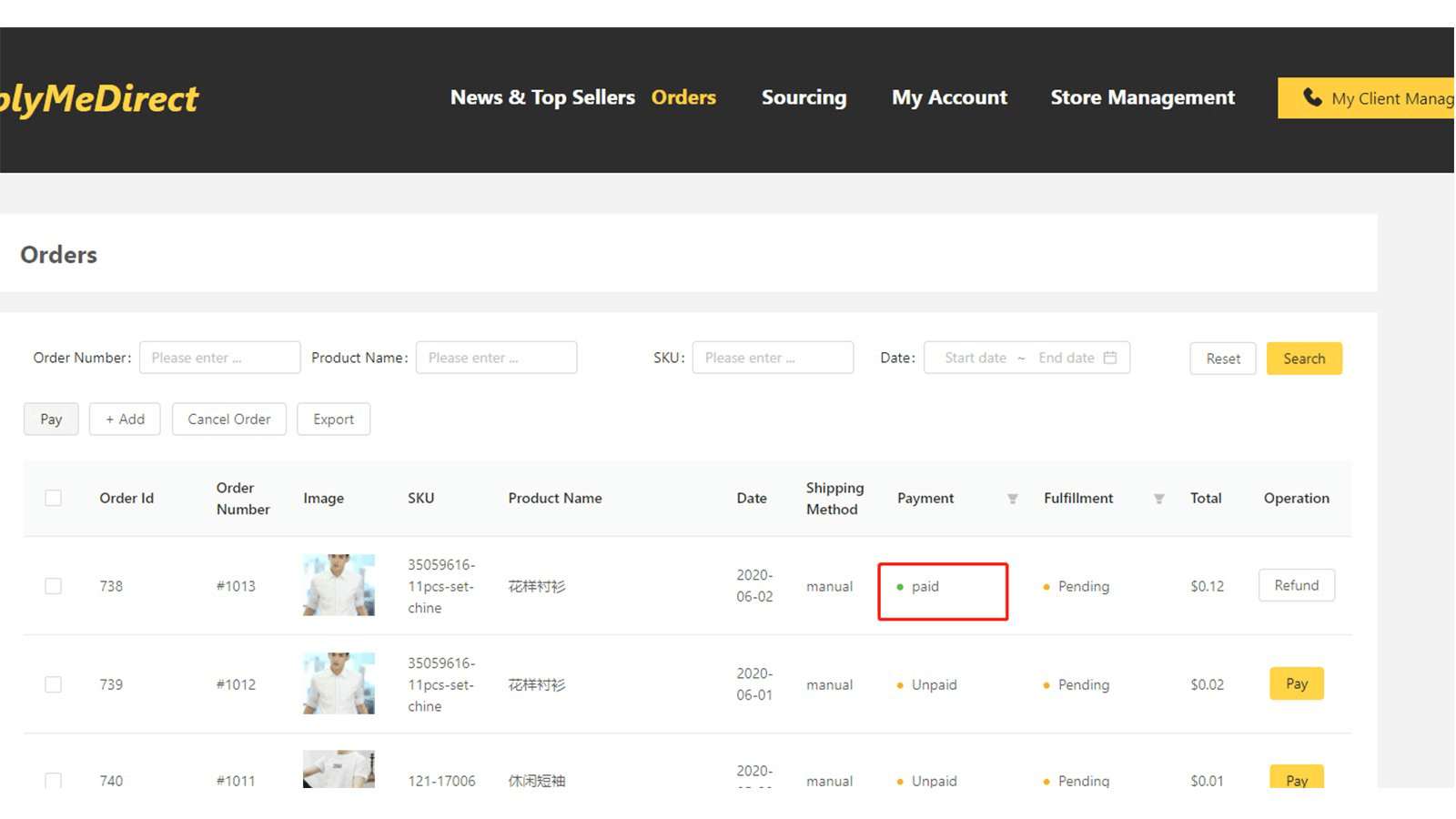
AOP+ Easy Print on Demand
Focusing on the EU, UK, and US, AOP+ Easy Print on Demand is a platform for selling on Shopify and Etsy, specializing in organic print-on-demand products and services. Like SupplyMeDirect, the AOP+ Shopify app syncs with your Shopify store and automates order processing and fulfillment. It’s easy to use, and you can create a product in as little as 30 seconds.
AOP+ executes all the printing itself, as opposed to using a third-party supplier, and it will even work with you to create your own custom private labeled products. It specializes in apparel and accessories, so perfect if you want to start an online boutique, and includes things like t-shirts, flip-flops, totes, and wall plaques.
Merchants also find their live customer support team to be extremely helpful and informative.
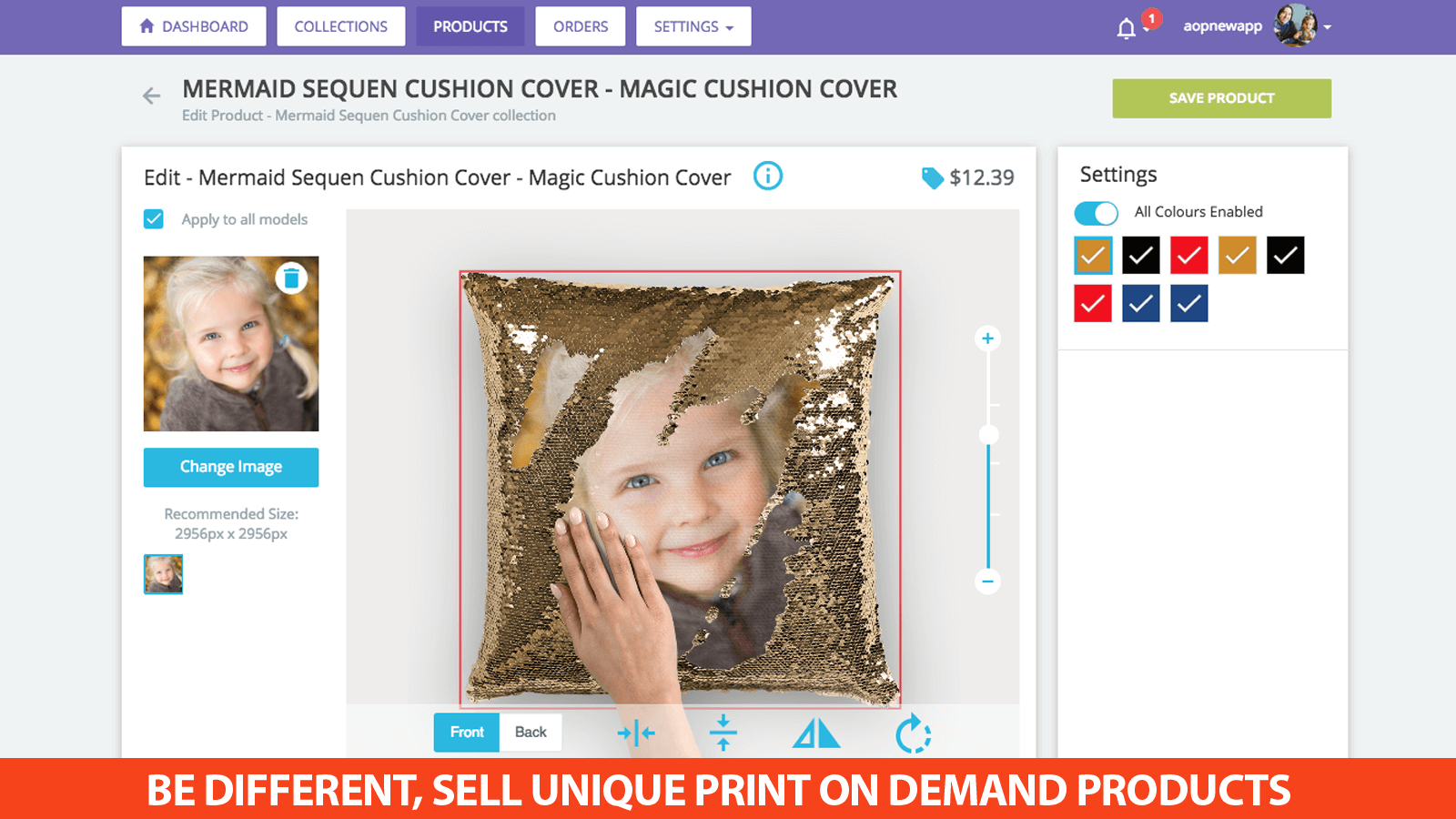
Apliiq - Print On Demand
Los Angeles–based Apliiq is another private label supplier and print-on-demand company that specializes in apparel items. It focuses on trendy products like woven labels, pocket tees, liner hoodies, and patch beanies.
Like SupplyMeDirect and AOP+, Apliiq automates order processing and fulfillment, and it ships every order within a week. The Shopify app also sends tracking information directly to your customers, so they can see when their order will arrive.
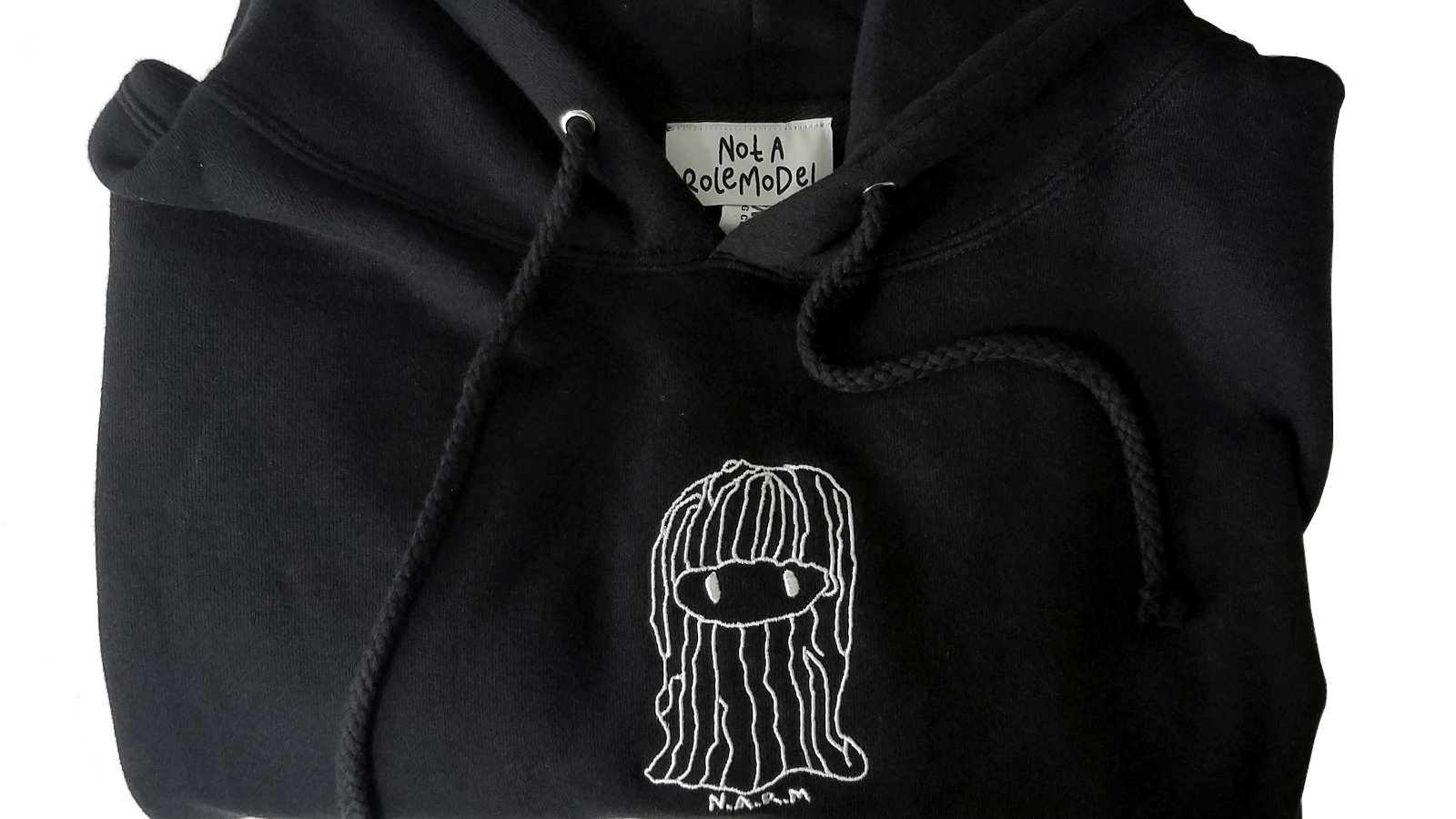
Modalyst - Dropshipping
Modalyst is a dropshipping supplier that works with US-based providers and is also an AliExpress Partner. This means it has one of the more extensive product catalogs on this list—you can choose from more than a million products to dropship.
As far as private labeling goes, it specializes in athleticwear. Subscribing to Modalyst’s Pro plan, which costs $90/month and has a 5% transaction fee, gets you unlimited products, custom packaging and branding, and fast shipping—typically three to eight days for US orders and under 15 business days for international shipping.
Like other manufacturer apps for private labels, Modalyst automates order processing and fulfillment. If you run into any issues or have questions, you can get in touch with live chat support seven days a week.
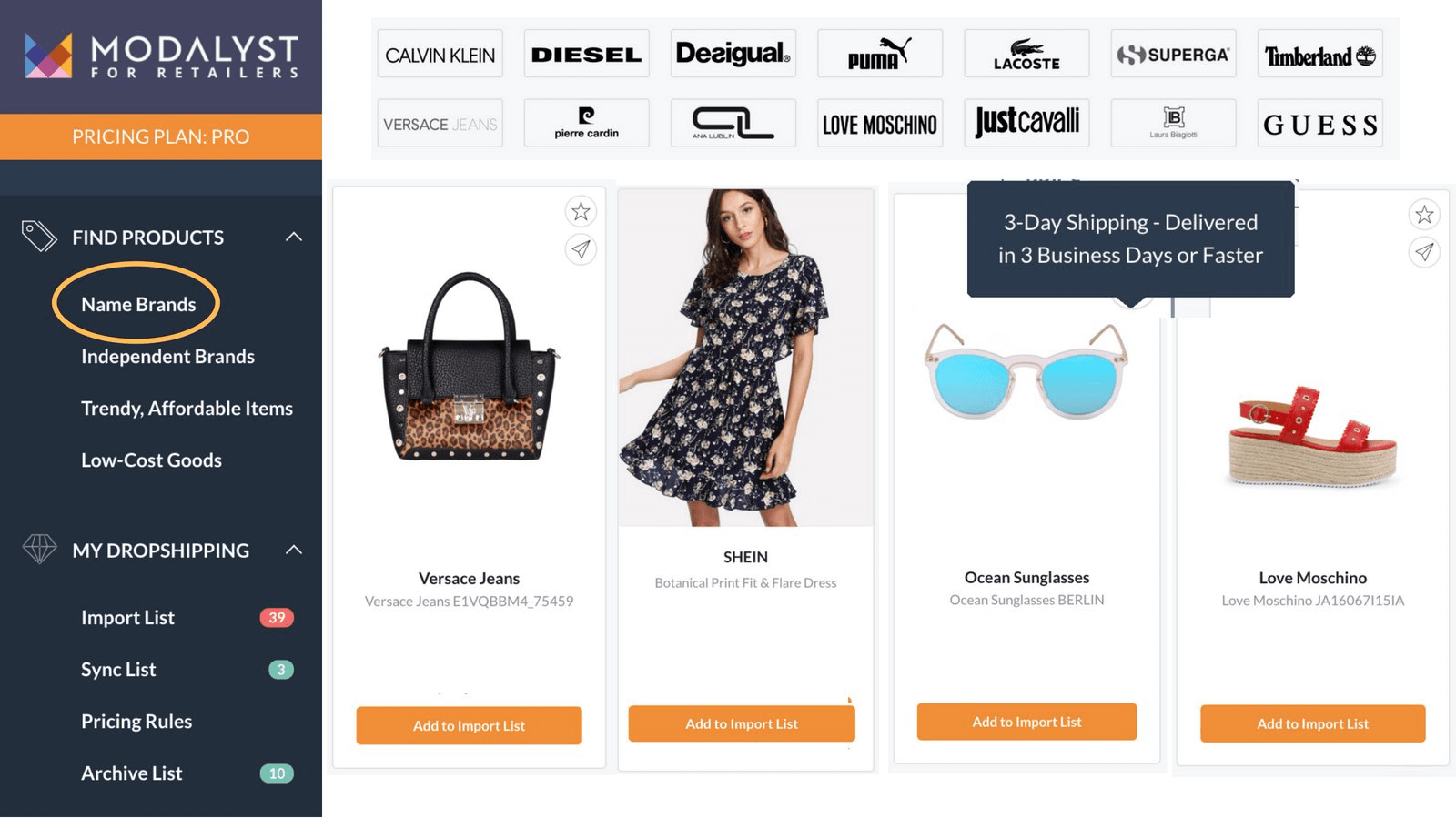
Alibaba
Alibaba Group is one of the largest ecommerce companies in the world (if not the largest)—its revenue hit more than $72 billion in 2020. Alibaba offers one of the most comprehensive directories, connecting suppliers with merchants everywhere.
Though Alibaba doesn’t have a Shopify app and you can’t integrate the two, there are so many private label products available that it’s worth a mention. You can find just about any product you can think of on Alibaba’s massive directory.
While Shopify apps automate a lot of the process, when you work with Alibaba you purchase a large quantity of private label products directly from the manufacturer. This lowers your inventory costs and boosts profits, but also requires a larger upfront investment. Manufacturers will work with you to create custom designs and logos.
We put together two guides to help you navigate Alibaba and its sister site, AliExpress:
- Alibaba Dropshipping: How to Safely Source and Manage Products From Alibaba
- The Dropshipper’s Guide to Sourcing From AliExpress
Dripshipper
If you’re looking specifically to private label and sell coffee online, look no further than the Dripshipper Shopify app. You can create and customize your own branded packaging, logo, pricing, and labels.
Dripshipper is based in the US, but it ships worldwide. All shipments go out within five days of when orders are placed—and the coffee is always fresh. Whole beans go out the same day they’re roasted, while ground beans go out next day.
Pricing starts at $30/month, and higher-priced tiers come with added support, coaching, and training. The Elite plan, at $197/month, also gets you access to Dripshipper’s in-house design team.
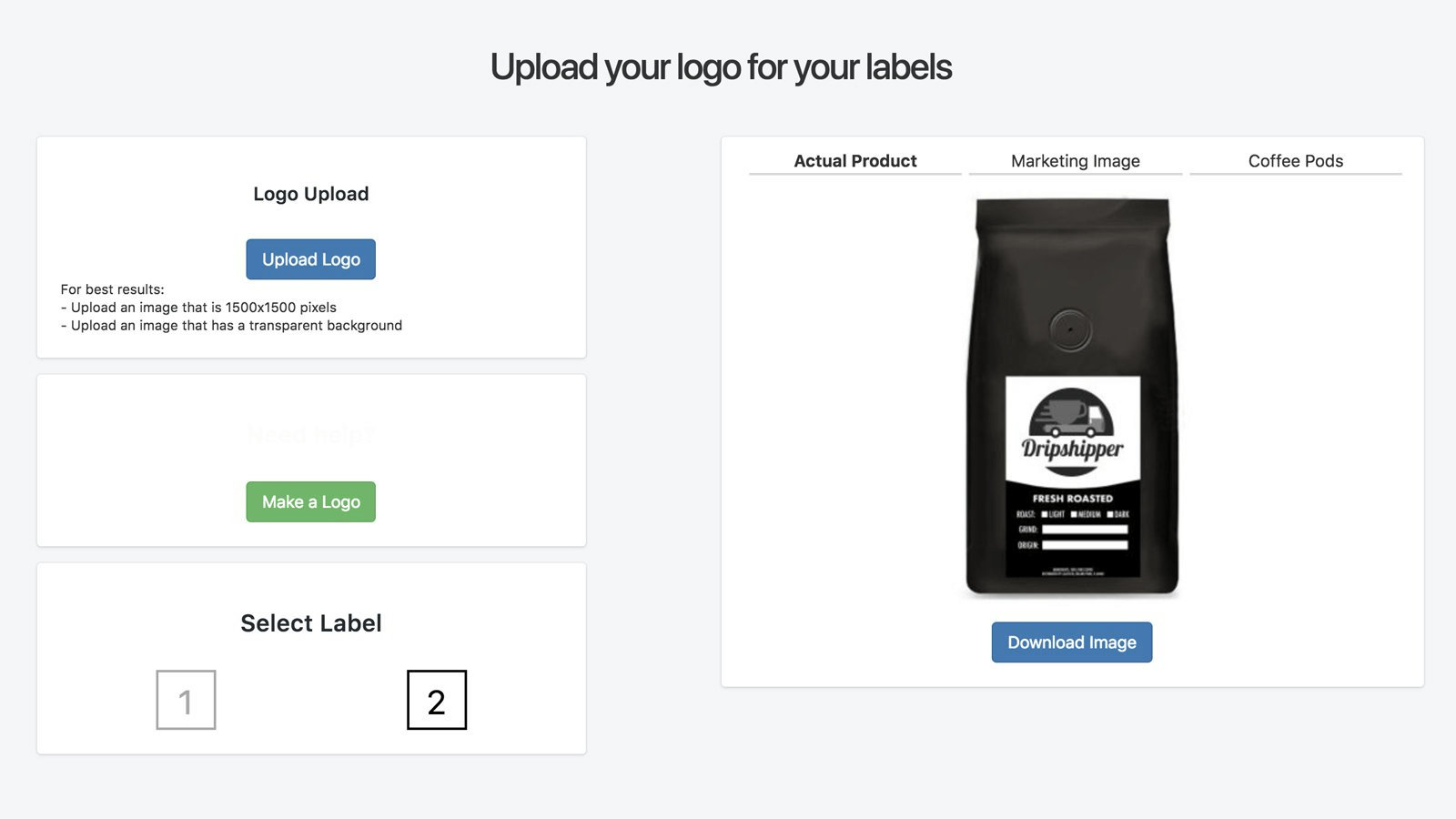
Tips for starting a private label business
When you sell private label products, you don’t have to worry about product development—or inventory investments in many cases. But before you begin, it’s important to consider a few things:
1. Find a niche market to sell products
There are lots of private label products you can sell, spanning pretty much every industry. Some of the most popular private label products are:
- Hair products
- Body products
- Pet products
- Baby products
- Beard grooming products
- Health products
To figure out specifically what to sell, explore different niche markets within those categories. When you sell to a niche market, you can use highly targeted marketing and advertising strategies to get your brand and products out there.
2. Contact the manufacturer
Once you know what you want to sell, look for manufacturers and suppliers who have those items. Some manufacturers may specialize in a specific product category, like Dripshippers.
Get your shortlist of manufacturers and contact them to see if they offer private labeling. If so, inquire about setting up an account. Since most manufacturers carry a variety of products, this strategy will allow you to quickly source a selection of products within the niche you’re exploring. Also be sure to ask if the manufacturer has a minimum order value, as you’ll need to navigate if you want to hold the stock or set up a prepay account with the manufacturer.
3. Order samples
It’s important to test the product yourself before you make it available for purchase. While something may look great online, and even sound great once you’ve gotten in touch with the manufacturer, the reality may be completely different. So you’ll want to do your due diligence to ensure the quality of products is up to your standards and expectations.
4. Set up an online store
You have your manufacturer and your products, now it’s time to set up your online store. With Shopify, you can choose from and customize free and paid ecommerce templates. Once you’ve set up your online store, you can browse the Shopify App Store to find the apps you need to manage your private label business, including any of the options listed above.
5. Add your products to your store
When adding products to your store, you’ll want to do the following:
- Write compelling product descriptions. Product descriptions should be information- and benefits-oriented, as opposed to focused on listing features and specs.
- Get high-quality product images. Product photos give shoppers an idea of what the item looks like—it’s the best they can get without being able to see the product in person. Sometimes the manufacturer can provide images to you.
- Determine your pricing strategy. It’s important to price high enough to make a decent profit but not so high you outprice your customers.
6. Launch and market your store
When you’re ready to reveal your store and private label products to the public, it’s not as simple as turning on a switch. You have to build awareness and drive traffic to your site if you expect to make any sales.
For new stores, paid advertising on channels like Google, Facebook, and Instagram are a great way to get your name out there. Then you can supplement those efforts with email marketing, social media, content marketing, SEO, and customer loyalty programs.
Launch your private label brand
Starting a private label brand takes the hassle out of product development. You can start your own private label and work directly with manufacturers to create products your customers will want to buy—all with your unique branding and logo on it. Private labeling is a great way to get started with selling your own products online.
Illustration by Till Lauer
